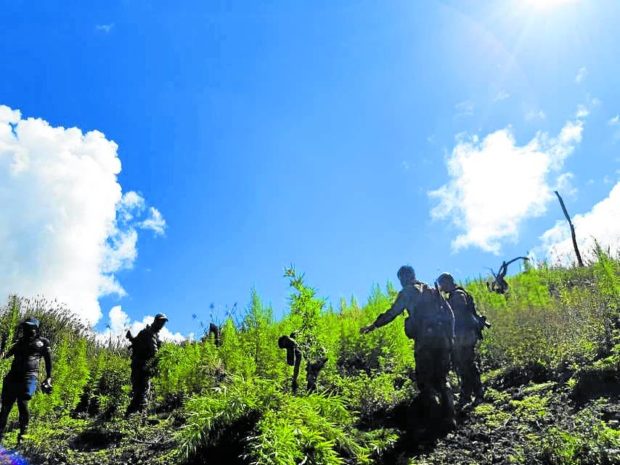In Cordillera, 22 people, including poll bets, probed for drug ties

UPROOTED Authorities found and destroyed this marijuana plantation at Mt. Chumanchill in Tinglayan, Kalinga province, in September. —POLICE REGIONAL OFFICE-CORDILLERA PHOTO.
BAGUIO CITY, Benguet, Philippines — At least 22 individuals, some of them elected officials, in the Cordillera region will be investigated for their alleged ties to illegal drugs in the run-up to the 2022 national elections, an official of the Philippine Drug Enforcement Agency (PDEA) said on Monday.
Gil Cesario Castro, director of the PDEA in Cordillera, said these officials on the list were included in the Inter-Agency Drug Information Database (IDID) and would undergo a “thorough investigation” by a regional adjudication committee to validate the evidence gathered by various intelligence sources.
Castro revealed that a resident of Abra province, who is running for a local post next year, has refused to release his drug test results to government adjudicators. This candidate would remain in the IDID as a suspected drug user until he proved otherwise, said Castro at a briefing to discuss PDEA’s year-end performance in the region.
Castro said 44 other elected officials in Cordillera were investigated but were cleared of their alleged drug ties. These included five mayors, a provincial board member, and some chiefs and councilmen in villages.
The sole member of the judiciary in the IDID was employed in Baguio City and was subsequently dismissed by the Supreme Court, Castro said.
Article continues after this advertisementThe IDID also listed 33 civilians, 15 of whom reside in Abra, but 21 were delisted, including a person in Apayao province who had passed away.
Article continues after this advertisementPretend tourists
“We are racing to complete the adjudication process so these issues won’t be used in the 2022 elections,” Castro said, noting that some of the IDID personalities may be candidates in next year’s polls.
More than 600 anti-drug operations were conducted this year in the region where marijuana plantations proliferate, leading to the arrest of 503 suspects, he said.
More than 400 of them were not from the region, some of whom were caught pretending to be tourists so they could smuggle out the illegal weed. The faux tourists were found to be major marijuana suppliers in Metro Manila, Castro said.
He said 2021 was “an unprecedented year for law enforcement” in six years of the drug war in the Cordillera because their operations led to the confiscation of P1.6 billion worth of marijuana and “shabu” (crystal meth) before the contraband could be distributed.
More than 600 drug cases have also been filed this year, including those people held responsible for the marijuana plantations found in off-road areas of Kalinga, Benguet, and Mountain Province.
Castro said one suspect helped prove that marijuana was an actual cash crop for some upland farmers, and were hidden with vegetables that were being transported to other provinces.
Law enforcers also foiled an attempt of a supplier of ecstasy to gain a foothold in Baguio, with the seizure in August of P3 million worth of the party drug from a Quezon City resident.
“Our studies suggested it was a test run to see if Baguio is suitable for storing ecstasy because drug peddlers have been drawing heat in Manila,” Castro said.